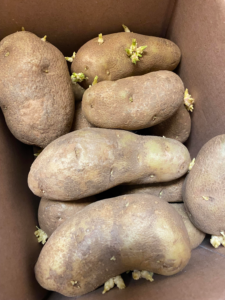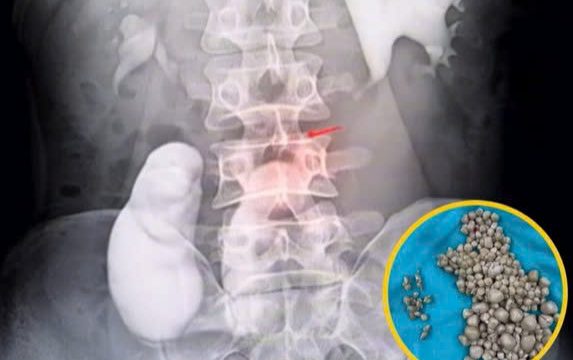Finding potatoes with sprouts in your kitchen is not uncommon, especially when they’ve been sitting around for a while. But what should you do when you come across these sprouted spuds? Are they still safe to eat, or should they be tossed out? In this post, we’ll discuss everything you need to know about the safety of sprouted potatoes and whether they can still be consumed.

What Happens When Potatoes Sprout?
Potatoes sprout when they start developing shoots or “eyes,” which are small growths trying to reproduce. This happens when potatoes are exposed to light, warmth, or when they’ve been stored for a long period of time. Although the sprouting process itself isn’t inherently dangerous, it does affect both the quality and safety of the potato.
The sprouting occurs as part of the natural aging process of the potato. When a potato is exposed to certain conditions, it interprets this as an opportunity to grow new plants. The shoots or sprouts are a result of this process, and while they might look harmless, they can make the potato unsafe for consumption if not handled properly.
Are Sprouted Potatoes Safe to Eat?
The safety of eating sprouted potatoes really depends on several factors, including how far along the sprouting process is and the overall condition of the potato. Here are some guidelines to help you decide whether those sprouted potatoes can still be eaten:
- Remove the Sprouts and Green Areas:If your potatoes have sprouted, you can usually still use them by carefully removing all the sprouts and any green areas. The sprouts, as well as the green patches, contain solanine—a natural toxin produced by potatoes as a defense mechanism. Solanine can be harmful if consumed in large amounts, causing symptoms like nausea, headaches, and digestive issues. Removing the sprouts and cutting away the green portions significantly reduces the risk of solanine exposure.
- Check for Other Signs of Spoilage:Before you decide to cook sprouted potatoes, it’s crucial to check for other signs of spoilage. If the potato is soft, shriveled, or has an unpleasant odor, it is better to discard it. Potatoes that are overly soft or have a foul smell are more likely to be spoiled, and eating them could pose health risks.
- Cook Thoroughly:Cooking sprouted potatoes thoroughly can help reduce the amount of solanine present, making them safer to eat. However, even with cooking, it’s wise to avoid eating large quantities of sprouted potatoes, especially if they have a lot of green areas or if the sprouts were substantial. If the potato looks too far gone, it’s better to err on the side of caution and discard it.
Why Are Sprouted Potatoes a Concern?
Sprouted potatoes are a concern because of the increased levels of solanine, a toxin that can cause various health issues when consumed in significant amounts. Solanine is produced as a natural defense mechanism to protect the potato from pests and adverse environmental conditions. It tends to develop when potatoes are exposed to light or are improperly stored. The green color that appears on the skin is a visible indicator of solanine, and it’s important to cut away these areas before cooking and eating.
Solanine can be toxic if ingested in large amounts, leading to symptoms such as nausea, stomach cramps, headaches, and in severe cases, neurological problems. This is why it’s important to handle sprouted potatoes with care, ensuring that any green or sprouted portions are thoroughly removed.
How to Prevent Potatoes from Sprouting
To avoid dealing with sprouted potatoes in the first place, proper storage is key. Here are some tips to help prevent your potatoes from sprouting:
- Store in a Cool, Dark Place:Potatoes should be stored in a cool, dark place with good ventilation. Avoid exposing them to sunlight, as light triggers the production of solanine and speeds up the sprouting process. A pantry or cellar that maintains a stable, cool temperature is ideal. It’s also best to avoid storing potatoes in the refrigerator, as the cold can cause the starches in the potatoes to convert to sugar, affecting their taste and texture.
- Use Proper Storage Containers:Store potatoes in breathable containers, such as paper bags or baskets. Plastic bags should be avoided because they trap moisture, which can accelerate spoilage and sprouting. Breathable storage allows for better air circulation, helping keep the potatoes fresh for longer.
- Keep Away from Onions:While it may seem convenient to store onions and potatoes together, this is actually counterproductive. The gases released by onions can accelerate the sprouting process in potatoes, so it’s best to store them separately to prolong their shelf life.
- Monitor Regularly:Regularly checking on your stored potatoes can help you catch the sprouting process early. If you notice some potatoes starting to sprout, use those first, and make sure to remove the sprouts before cooking them.
Conclusion
Sprouted potatoes can be safe to eat, but only if handled with caution. The sprouts and any green areas should always be removed to minimize the risk of solanine poisoning. Regular inspection of your stored potatoes and proper storage techniques can also help prevent sprouting in the first place, ensuring your potatoes stay fresh and safe to eat.
If you have any doubts about the safety of sprouted potatoes, it’s always best to err on the side of caution and discard them. Health risks from consuming spoiled or heavily sprouted potatoes are not worth the potential consequences. By following these guidelines, you can make informed decisions and continue to enjoy potatoes as part of a healthy diet—without any unwanted surprises.
So next time you find sprouted potatoes in your kitchen, don’t panic. Just take a moment to assess their condition, remove the sprouts, and use them wisely. Potatoes are versatile and nutritious, and with proper care, you can continue to enjoy them safely.





